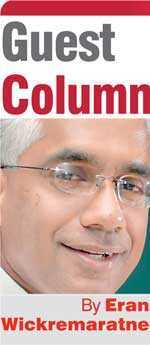Sunday Feb 22, 2026
Sunday Feb 22, 2026
Friday, 12 February 2021 00:00 - - {{hitsCtrl.values.hits}}
 Dr. Neville Fernando’s death a few days ago ended the colourful life of a doctor, politician, entrepreneur in printing technology and visionary.
Dr. Neville Fernando’s death a few days ago ended the colourful life of a doctor, politician, entrepreneur in printing technology and visionary.
I may not have agreed with some positions taken by Dr. Fernando in politics but I am an admirer of his courage and vision in pursuing what he thought was in the best interest of society. I want to highlight a few of his achievements and attempts to create a better society.
He had a thriving private medical practice and was well-known for treating patients irrespective of their ability to pay. It endeared him to the community. This was noticed by the UNP and he was invited to contest the General Elections of 1977.
Dr. Fernando overturned the leftist stronghold of Panadura and became a Member of Parliament. However, his stint in Parliament was short-lived because of his outspoken views. He had the boldness to question the leadership when he held alternative views.
He will always be remembered for opposing the removal of the civic rights of Sirimavo Bandaranaike when the Government used its majority to steamroll its opponents. Dr. Neville Fernando, a Government MP, refused to follow the party line but acted according to his conscience.
Ironically, today we face a similar situation where a government with a two-thirds majority threatens leading Opposition Members of Parliament with civic right removal.
Dr. Fernando was an entrepreneur in diverse fields. His interests ranged from hotels, plantations, manufacturing to education. There were many doctors, engineers and other educated persons in Dr. Fernando’s extended family. He knew the value of education. He set himself the goal of expanding educational opportunities.
He once said: “We have few natural resources and can benefit from industrial development to a limit. But if we educate our children, we can create a knowledge-based economy and take our country forward.”
Dr. Fernando had insight into Sri Lanka’s strategic future, decades before others. He said ‘to achieve this objective we need private sector participation as well as government’. ‘We need public-private partnerships too,’ he opined.
With the encouragement of then Minister Wishwa Warnapala he set about establishing the South Asian Institute of Technology and Medicine (SAITM). The medical school required access to clinical training. As Government hospitals were not accessible, he built the Malabe Neville Fernando Hospital which the Government now manages.
In an interview in a Sinhala newspaper in July 2017, in his very candid manner, he asked: “Why do you think that there is opposition only to the provision of medical degrees? …Why is the GMOA acting like this? They are scared that if more doctors are produced it will affect the incomes of private practice. Without admitting to this fact, various other reasons are touted to block private sector initiated medical programmes.”
As a result, Sri Lankan students seeking a medical education attend medical schools in India, Nepal, Malaysia, Bangladesh, Australia, UK, China, Russia and many other countries, where standards of education vary. Wouldn’t it be better to provide private sector education in Sri Lanka with regulation by the Sri Lankan State?
It goes without saying that scarce foreign exchange resources could be saved. The enrollment of foreign students could be converted to a foreign exchange earning opportunity as well.
The SAITM medical school project was initiated during the Presidency of Mahinda Rajapaksa. I was part of the then Opposition, and we did not oppose the Rajapaksa Government initiative. In 2015 when we took office, we did not obstruct the progress of the project. But soon opposition to the project gathered momentum with the Rajapaksa Government allies turning against the project which they had initiated. This is the tragedy of Sri Lankan politics where you sacrifice your policy for the exigencies of a popular vote.
Dr. Neville Fernando will always be remembered for opposing the civic right removal of Sirimavo Bandaranaike, and daringly attempting to widen the opportunity to train medical students in our own country. I know that his ideal will eventually triumph because it is in the best interest of wider society.
(The writer is a Member of Parliament.)